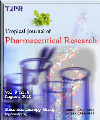
|
Tropical Journal of Pharmaceutical Research
Pharmacotherapy Group, Faculty of Pharmacy, University of Benin, Benin City, Nigeria
ISSN: 1596-5996
EISSN: 1596-5996
Vol. 14, No. 9, 2015, pp. 1589-1595
|
 Bioline Code: pr15207
Bioline Code: pr15207
Full paper language: English
Document type: Research Article
Document available free of charge
|
|
|
Tropical Journal of Pharmaceutical Research, Vol. 14, No. 9, 2015, pp. 1589-1595
| en |
Inhibitory Effect of Berberine on Zeste Homolog 2 (Ezh2) Enhancement in Human Esophageal Cell Lines
Chen, Si-Ze; Chen, Xue-Mei; Li, Yu-Qi; Zhang, Fan; Yang, Shu; Mo, Kai Lan; Mo, Xian-Yi & Ding, Ying
Abstract
Purpose: To investigate the inhibitory effect of berberine treatment on enhancement of zeste of
homolog 2 (Ezh2) expressions in KYSE450 human esophageal cancer cells.
Methods: Transwell motility chambers were used to analyze cell migration and invasion. Bio-Rad
protein assay was used for the determination of protein concentration. Chemiluminescence with ECL
system was employed for the detection of protein bands as per the manufacturer’s protocol. Staining
was carried out with Alexa-Fluor 647 mouse anti-BrdU antibody. Flow cytometry was performed after
adding DAPI. Annexin-V/DAPI staining and flow cytometry were used for the quantification of apoptotic
cell death. Total RNA was isolated from KYSE450 cells using an RNA isolation kit.
Results: Berberine-induced inhibition of Ezh2 expression led to inhibition of cell proliferation by G1
phase cell cycle arrest and induced anti-invasive properties of KYSE450 cells in Boyden chamber
assays. There was 92 % reduction in invasive tendency of KYSE450 cells following treatment with
berberine. Histone methylation inhibitor, 3-deazaneoplanocin A (DZNep), also led to a similar effect on
cell proliferation of KYSE450 cells. Berberine treatment also resulted in strong transcriptional reduction
of the AXL receptor kinase. The results of qRT-PCR and FACS analyses showed significant inhibition of
AXL mRNA and protein expression in KYSE450 carcinoma cells after treatment with berberine.
Conclusion: Berberine may be an effective therapeutic agent in the treatment of esophageal
carcinoma.
Keywords
Berberine; Histone methylation inhibitor; Anti-invasive; Cell proliferation; Human Esophageal cancer
|
| |
© Copyright 2015 - Tropical Journal of Pharmaceutical Research
Alternative site location: http://www.tjpr.org
|
|
